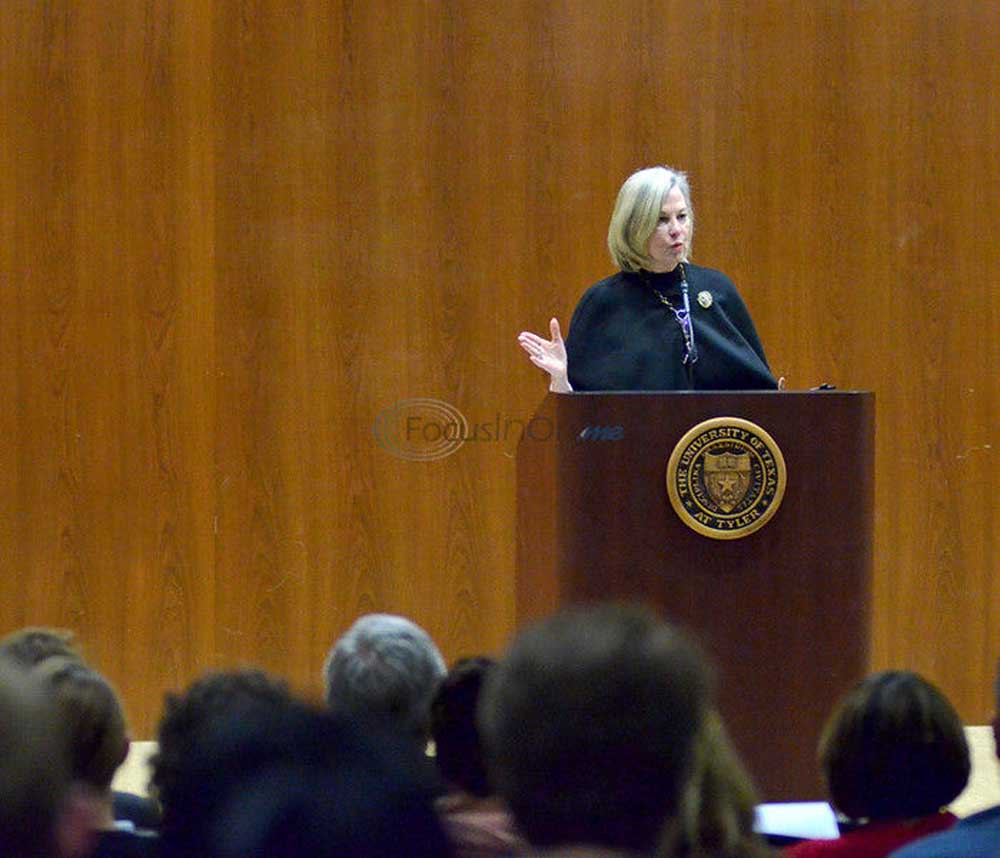Pulitzer Prize-winning journalist discusses Saudi Arabia’s internal politics
Published 9:45 pm Monday, November 11, 2013

- Pulitzer Prize-winning journalist Karen Elliot House speaks on Monday night at The University of Texas at Tyle’s University Center Theater. Ms. House, who spent more than 30 years writing about Saudi Arabia for The Wall Street Journal, spoke to students and community members about the future of Saudi Arabia, including its philosophy in foreign policy towards the United States and the world. (Victor Texcucano)
A Pulitzer Prize-winning journalist spoke to students at The University of Texas at Tyler on three major pillars within the Saudi Arabian society, how they are crumbling and what that means for U.S. relations at a lecture Monday evening.
Karen Elliot House, 64, retired in 2006 as publisher of The Wall Street Journal, senior vice president of Dow Jones & Co. and a member of the company’s executive committee, according to information released by the university.
Ms. House, a native Texan, has more than 30 years of experience writing about Saudi Arabia — as a diplomatic correspondent, foreign editor and publisher, according to the college. After she retired, she wrote the book, “On Saudi Arabia: Its People, Past, Religion, Fault Lines – and Future” and did extensive research in the country by talking to the people within it in addition to her experience working in the country as a foreign correspondent.
The speech was held in the UT Tyler University Center Theater as part of its Honors and Global Awareness Through Education programs, which aim to increase awareness of global issues within its student body.
Ms. House described Saudi Arabia as a collection of tribes under one flag. She said subsections of the culture rarely intermix, partially fuelled by a fear of doing anything that may be perceived as shameful to their family. Saudis are more likely to travel to the U.S. than to travel around their own country, she said.
The only real connector for the people is its religion — which runs so deep into society that new cars come with prayer rugs and the Koran is the law of the land.
“It’s like one of those Russian nesting dolls,” she said. “The individual is the little inside doll, topped by his family, topped by his tribe, topped by his religion topped by the (royal) family — and in that structure there is not a lot of room for individuality.”
Ms. House said through the Internet, the people of the country are questioning the strict interpretation of the Koran as well as some of the government’s actions that do not follow their holy book’s teachings. The result is a traditional older generation and a questioning younger one.
“That connection between what is officially preached and practiced is eroding the legitimacy of the religious establishment and, with that, the royal family,” Ms. House said.
The second pillar pertains to oil wealth.
The Saudi Arabian people are not taxed, and 90 percent of the government’s budget comes from oil revenues, Ms. House said.
The people are concerned about their own consumption of gasoline products, which is heavily subsidized by the government and therefore wasted by the people.
Saudi Arabia is “fundamentally a welfare state — almost everyone is dependent on the government for their livelihood,” she said. “As the Saudi population has exploded, they have not been able to keep up the quality of government services.”
Concerns also center around the U.S. moving toward energy independence and the possibility of Iranian oil on the market.
“Young Saudis (believe), ‘The oil wealth is ours, we shouldn’t have to pay,’ and the more the government gives, the more they expect so (the people) are concerned about that rising consumption,” she said.
The final pillar is a royal family that has become out of touch with its people.
“The leadership is very old and out of touch, and the princes need to create a succession from one generation to the next, and they don’t know how to do that,” Ms. House said.
The patriarch of the Saudi Arabian society had 44 sons by 22 wives. After the king died in 1953, the line of succession passed through the 44 sons from brother to brother instead of eldest son to eldest son, she said.
“Basically … the royal family, in my view, is consumed with its own internal, ‘How do we preserve our power and pass the torch?’ at a time when the whole region around them is unstable,” Ms. House said.
Ms. House said the Saudi people told her they wanted a good government that is transparent and accountable.
“I think the world looks very depressing to the Saudis right now,” she said.







